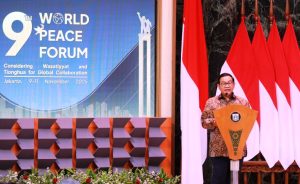
Islamic bonds
to boost financing (Photo: vibiznews)" width="359" height="268" /> BNI Syariah to issue Islamic bonds to boost financing (Photo: vibiznews)Jakarta, 12 Rabi’ul Akhir 1436/2 February 2015 (MINA) – Sharia lender Bank BNI Syariah is planning to issue Islamic bonds, or sukuk, this year to support its financing, an executive at its parent company has said.
Separately, BNI Syariah president director Dinno Indiano confirmed on Friday that the bank was still reviewing its sukuk-issuance plan with the expectation that it would be able to issue it before year’s end.
Dinno said funds raised from the issuance would help the bank to reach its financing goal this year.
Also Read: Saudi Arabia Wins Bid to Host World Expo 2030
Dinno previously said the bank aimed for 25 percent growth in both total financing and third-party funding this year, slower than last year as a result of the economic slowdown.
In 2014, BNI Syariah posted around Rp 15 trillion in financing, an increase of 30 percent year-on-year.
Dinno added that BNI Syariah continued to have a “solid” capital adequacy ratio (CAR), which would only decrease by 1 percent from 19 percent to around 18 percent by the end of 2015 if it achieved 25 percent financing growth.
As of last year, Dinno said, BNI Syariah posted Rp 1.5 trillion as its total capital, which he claimed was sufficient to sustain its business expansion without the need of injections from its mother company.
Also Read: 148 Products from Indonesia Promoted at Sarawat Superstore Jeddah
However, Dinno said the bank would need to start significantly raising its capital, either through an initial public offering (IPO) or private offering to particular investors but not until 2018.
“Our parent company has given us support in finding the best investor. We expect that our future investor will bring added value, such as improvements in IT for the bank. However, we will gradually offer only a maximum of 40 percent of our shares,” Dinno said.
The bank also has adequate liquidity, with its total finance-to-deposit ratio (FDR) standing at 93 percent at the end of last year, a decrease from 96 percent in early 2014, Dinno said.
A high FDR means a sharia bank has channeled a considerable volume of financing, while Bank Indonesia and Financial Services Authority (OJK) have been telling banks since last year to slow down credit to avoid overheating amid the current tight liquidity environment.
Also Read: Packaging Industry Supports Halal Ecosystem
The central bank has capped conventional banks’ loan-to-deposit ratio (LDR) at 92 percent, but the OJK has no plan yet to set an average cap on the FDR of sharia lenders.
Dinno said the declining FDR was a result of Religious Affairs Minister’s Regulation No. 30/2013 on haj fund management in sharia banks, which stipulates that all funds paid by would-be haj pilgrims should be deposited in sharia banks — prompting a major movement of money that was previously managed by conventional banks.
As of last year, Dinno said BNI Syariah managed 146,591 haj accounts worth a total of Rp 414 billion. The bank aims for another 5,000 haj accounts this year through expanding its partnership with more haj and umrah (minor haj) travel agents, up from the current 20, he added.
As part of its effort to increase haj funds and overall liquidity, Dinno said BNI Syariah had started a partnership with MasterCard Indonesia, part of MasterCard Worldwide, through a haj and umrah debit card for its existing and prospective customers.
Also Read: Indonesia-Japan Agree on Energy Transition Cooperation
“The cards will be given to the customers before their departures to Saudi Arabia so that they do not need to carry cash to pay for their haj or umrah living costs during the pilgrimage. The average transaction of a haj or umrah pilgrim amounts to 1,500 Saudi riyals [$399], or the equivalent of about Rp 5 million per day,” he said. (T/P009/P3)
Also Read: Dubai Expo 2020 Holds Special Event for Palestine































 Mina Indonesia
Mina Indonesia Mina Arabic
Mina Arabic